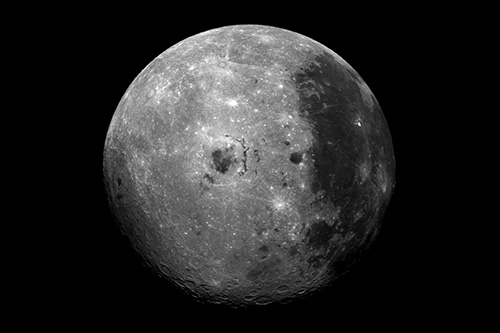英語記事に慣れる「サクっと読む英文」
2017.8.1
Hawking calls for a Moon base
Read the article to find out why Stephen Hawking thinks people should settle on the Moon.
スティーヴン・ホーキング博士が、人類は月へ移住するべきだと考える理由について記事を読んでみましょう。

Stephen Hawking is famous for researching black holes. He is also well-known for explaining difficult ideas in physics to regular people. His book A Brief History of Time was a best-seller. He is now 75 years old and is still a Professor at the University of Cambridge.
In his speech, Hawking explained his ambitious plan. He said astronauts should return to the Moon within the next three years, and go to Mars soon after that. People should be able to live on the moon within just 30 years.
“I am convinced that humans need to leave Earth,” Hawking said. He pointed out several factors that could make life on Earth difficult or even impossible: too many people, too few resources, and global warming. “We are running out of space, and the only places to go are other worlds.” He also said that one day a giant rock from space could hit the Earth, and humans will need space colonies to survive.
Hawking said that moving into space could also help humans still on Earth. Setting up space colonies will require many scientists and lots of money. Countries would have to work together. Hawking said he hopes space projects will “unite competitive nations in a single goal”.
Hawking’s plan is ambitious, but he is not alone in his goals. The head of the European Space Agency said last year that a Moon colony could be possible in about 20 years. His agency is already partnering with Russia to look for sites. This year, the US government promised NASA over $19 billion (about ¥2.1 trillion) to help support their goal of sending humans to Mars within about 30 years.
Some rich company presidents are also joining in. Elon Musk, the founder of Tesla, is trying to beat NASA to Mars. He said he wants to launch a robot by 2024. Richard Branson, President of the Virgin Group, will launch his company’s first space flights this year (and in fact, Stephen Hawking is scheduled to ride in one).
“It is clear we are entering a new space age,” Hawking said in his speech. He admits that there is a lot of work to do before humans can build space colonies. However, he says he “hopes for the best”. Hawking will continue to discuss his ideas in a BBC television show, Expedition New Earth, later this summer.
Stephen Hawking is famous for researching space. He is also well-known for explaining difficult scientific ideas to regular people. One of his books was a best-seller. He is now 75 years old. He still works at the University of Cambridge.
At the science event last month, Hawking explained his plan. He said humans should return to the Moon within the next three years. Then, people should go to Mars soon after that. People should be able to live on the moon within just 30 years.
Hawking said he thinks humans must leave Earth. He pointed out several things that could make life on Earth difficult. Some problems are, for example, too many people, not enough water and food, and global warming. Hawking said, “We are running out of space, and the only places to go are other worlds.” He also said that one day a giant rock from space could hit the Earth. If that happens, humans will need space colonies to live.
Hawking said that moving into space could also help humans still on Earth. Setting up space colonies will need many scientists and lots of money. Countries will have to work together. Hawking said he hopes all countries will work to help each other.
Other people share Hawking’s goals. Last year, the head of the European Space Agency said that a Moon colony could be possible in about 20 years. His agency is already working with Russia and looking for sites. This year, the US government said they will give NASA over $19 billion (about ¥2.1 trillion). This money is to help with NASA’s goals. NASA wants to send humans to Mars within about 30 years.
Some rich company presidents are also joining in. Elon Musk, the creator of Tesla, is trying to get to Mars. He said he wants to send a robot by 2024. Richard Branson, President of the Virgin Group, will also start his company’s first space tours this year.
Hawking said that “a new space age” is starting. He said that there is a lot of work to do before humans can build space colonies. However, he hopes for good results. Hawking will explain his ideas more in a BBC television show later this summer.
キーフレーズ
physicist 物理学者
progress 進展、進歩
regular person (people) 世間一般の人(人々)
この記事では、“regular people” は「専門家ではない一般の人々」という意味で使われており、「Hawking は(物理学の知識のない)一般の人々にも、物理学の難しい考えを説明することで有名である」、と書かれています。
例:That book on engineering would be difficult for a regular person to understand.
(あのエンジニアリングの本は、一般の人には理解が難しいだろう。)
※同義語として、“laypeople” も「専門的知識のない人々」、「素人」という意味で使うことができます
ambitious 壮大な
astronaut 宇宙飛行士
be convinced that ~ ~であると確信する
(that以下の事柄が)そうであると固く信じることを意味する表現です。
例:She seemed convinced that he would show up eventually.
(彼女は彼がそのうち現れると確信したようだ。)
point out ~ ~を指摘する
▼こちらもCheck!
使いこなす句動詞 “point out”
run out 尽きる
▼こちらもCheck!
使いこなす句動詞 “run out”
competitive nations 競争的な国々
look for ~ ~を探す
▼こちらもCheck!
使いこなす句動詞 “look for”
site 場所
beat (someone) to ~ (人)より先に~に着く
敵や競争相手などより先に目的地に到着する、先を越す、という意味です。
例:I was going to take the garbage out but you beat me to it.
(私がごみを出すつもりだったけど、あなたに先を越されてしまった。)
admit ~を認める
あることが事実だと受け入れ、承認するという意味です。不本意ながら、もしくはしぶしぶ認めるというニュアンスで使われることも多くあります。
例:I admitted my mistake and she forgave me.
(私は自分の過ちを認め、彼女は私を許してくれた。)


 【Gabaからのお知らせ】
【Gabaからのお知らせ】 【特集】
【特集】 【英単語の正しい使い分け】
【英単語の正しい使い分け】 【使いこなす句動詞】
【使いこなす句動詞】